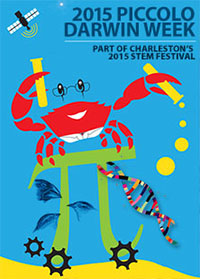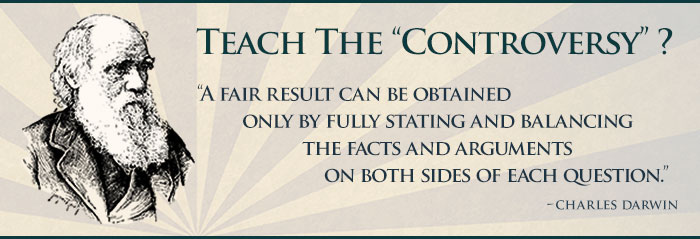Don’t
Miss — 
2015 Event Venues
The School of Science and Math Auditorium,
College of Charleston
Located at the intersection of Coming and Calhoun Streets, across from
the College Library. The NSCB (New Science Center Building) Auditorium
is Room 129.
Grimsley Hall, The Citadel
The Citadel’s Grimsley Hall is located at the north end of
Summerall Field, on Jenkins Avenue.
Maps of the CofC
Campus, and The Citadel are available online.
Circular
Congregational Church
Circular
Congregational Church is located at 150 Meeting Street.
First (Scots) Presbyterian Church
First (Scots) Presbyterian Church is located at 53 Meeting Street. Enter the parking lot from King Street. The fellowship hall is on the King Street side.
PAST YEARS’
Darwin Week In Charleston, Since 2001
2001
Darwin Week
2002 Darwin Week
2003 Darwin Week
2004 Darwin Week
2005 Darwin Week
2006 Darwin Week
2007 Darwin Week
2008 Darwin Week
2009 Darwin Week
2010 Darwin Week
2011 Darwin Week
2012 Darwin Week
2013 Darwin Week
2014 Darwin Week
DarwinDay.org
The International Darwn Day Foundation, celebrating Science and Humanity.
Evolution Weekend
An opening for serious discussion on the relationship between religion and science, from The Clergy Letter Project.
EVOLUTION
SUNDAY:
Consider the Lilies... and the Finches
Sunday, February 8
Two services - 8:30 and 11:00 a.m.
Rev. Dr. Jeremy Rutledge
Circular Congregational Church (150 Meeting St) is a progressive Christian church that affirms science and religion as partners in the search for truth and meaning. As we begin Darwin Week, Rev. Rutledge will reflect on how Darwin’s discoveries have opened up new ways of thinking about ourselves, our lives, our ethics and spirituality. Our understanding of cosmic and natural evolution may help us move beyond the narrow confines of anthropocentrism to a richer, fuller view of life.
The Rev. Dr. Jeremy Rutledge is senior
minister at
Circular
Congregational Church (UCC) downtown. He studied
at
Baylor University, the Baptist Theological Seminary at Richmond, and
Meadville Lombard Theological School in Chicago, where his doctoral
work focused on religious naturalism. Rev. Rutledge is a
longtime
member of the Institute on Religion in an Age of Science.
Before
coming to Charleston, he was senior minister at Covenant Church in
Houston for ten years.
Panel
Discussion –
Teaching the Controversy?
A Conversation on Science Education and Religious Conviction
Sunday, February 8 at 7:00 p.m.
First (Scots) Presbyterian Church
Moderated by Rev. Dr. James B. Miller
From the fall of 2013 through most of 2014, the agencies responsible for developing the science curriculum of South Carolina were deadlocked over High School Standard H.B.5, Biological Evolution. Do controversies of this sort originate from a legitimate scientific challenge to modern evolutionary theory? Or do they arise from political ideologies or competing religious convictions? And what place should “teaching the controversy” have in the public school science curriculum? Join representatives of the religious and educational communities for a public conversation exploring these questions.
Reception to follow.
››Sponsored by the Howard Hughes Medical Institute.
Dr. Mick Zais has just stepped down from
his position as State Superintendent of Education.
Dr. Wes McCoy has recently retired as chairman the science department at North Cobb High School,
Georgia.
Rev. Dr. Anna Case-Winters is Professor of Theology at McCormick
Seminary in Chicago..
The Evolution of Goodness
Monday, February 9 at 4:00 p.m.
CofC School of Sciences and Math Auditorium
Dr. Lee A. Dugatkin
In a world supposedly governed by ruthless survival of the fittest, why
do we see acts of goodness in both animals and humans? This problem
plagued Charles Darwin in the 1850s as he developed his theory of
evolution through natural selection. Indeed, Darwin worried that the
goodness he observed in nature could be the Achilles heel of his
theory. Ever since then, scientists and other thinkers have engaged in
a fierce debate about the origins of goodness that has dragged
politics, philosophy, and religion into what remains a major question
for evolutionary biology.
Reception to follow.
››Sponsored by the CofC Department
of Biology
Dr. Lee Dugatkin is
Professor of Biology at The University of Louisville. He is
the
author of over 150 scientific articles and four books on the evolution
of cooperation, including Cooperation Among Animals (Oxford) and The
Altruism Equation (Princeton).
The Largest Structure in the Universe: How big is too big?
Tuesday, February 10 at 4:00 p.m.
CofC School of Sciences and Math Auditorium
Dr. Jon E. Hakkila
The evidence in support of the Big Bang is rich and diverse, but many questions remain unanswered. Modern cosmology (the study of the nature, origin, and evolution of the universe) assumes that matter is distributed uniformly on large scales; this is called the ‘cosmological principle.’ Few astronomical structures have been large enough to challenge the cosmological principle until recent discoveries of the Sloan Great Wall, the Huge Large Quasar Group, and the Hercules-Corona Borealis Great Wall. All these objects border on being too big to be easily explained by cosmological models, leading to the question, ‘How big is too big?’ Dr. Hakkila will present his research team’s evidence for the largest structure in the universe (the Hercules-Corona Borealis Great Wall) and discuss the potential questions it raises regarding modern cosmology, statistics, and semantics.
Reception to follow.
››
Sponsored by the CofC Department of Physics and Astronomy.
Dr. Jon Hakkila is a professor in the Department of Physics & Astronomy at the College of Charleston. He specializes in the studies of cosmic gamma-ray bursts (the most luminous sources in the universe) and astrostatistics/astroinformatics (the characterization of astronomical data). He is part of a research team that recently discovered the largest structure in the universe.
Learning From Insect Brains
Tuesday, February 10 at 7:00 p.m.
117 Grimsley Hall, The Citadel
Dr. John G. Hildebrand
The insects are remarkably speciose, diverse, and successful animals
from which we can learn much about the evolution, mechanisms, and
disorders of neural systems and behavior. Explorations of the
diminutive brains of insects reveal principles and mechanisms of neural
development and function and at the same time help us understand both
beneficial and harmful insect behaviors. This presentation will
introduce the power, beauty, and importance of insect neurobiology and
outline the importance of this kind of research for human health and
welfare.
Reception preceding in Room 204.
››
Sponsored by the Charleston Chapter of
Sigma Xi
Dr. John Hildebrand is Regents
Professor of Neuroscience and Professor of Chemistry &
Biochemistry, Entomology, and Molecular & Cellular Biology at
the
University of Arizona in Tucson. He has authored over 215
papers
and edited five books on insect nervous systems, mainly the
neurobiology of the olfactory system.
Repeat
presentation –
Learning From Insect Brains
Wednesday, February 11 at 4:00 p.m.
CofC School of Sciences and Math Auditorium
Dr. John G. Hildebrand
See above for the abstract and a brief biography of the
speaker.
Reception to follow.
››Sponsored by the Charleston Chapter of Sigma Xi
God, Human Reason, and the Origin of Birds
Thursday, February 12 at 4:00 PM
CofC School of Sciences and Math Auditorium
Ms. Emily Willoughby
Young-earth creationism continues to thrive in the U.S.,
despite
ever-increasing research and public outreach. What are we doing wrong?
This discussion with writer and illustrator Emily Willoughby will argue
that creationists are more likely to accept the reality of evolutionary
science when shown that it is compatible with Christian theology. The
beauty and elegance of evolution stands not only on solid scientific
ground, but accepting it is a natural application of Christian ideals
as well. Nothing demonstrates this better than the transition of
dinosaurs into birds, for which we have a tremendous wealth of data.
Birthday Party for Charles Darwin to follow.
››
Sponsored by the CofC Department of Geology
and Environmental Geosciences
Emily Willoughby is a writer and
scientific
illustrator who specializes in restorations of birds and extinct
animals. She received her bachelor's degree in biology from Thomas
Edison State College before working full-time in freelance scientific
illustration. Her work has been featured in a variety of media and
institutions, including the Shanghai Natural History Museum, the
journal Nature, and publications by National Geographic and Scholastic.

